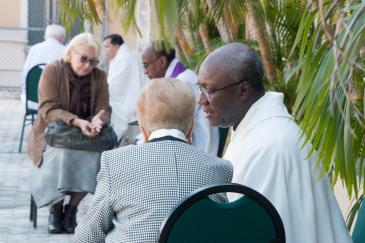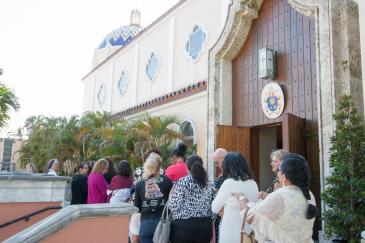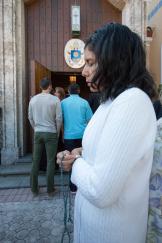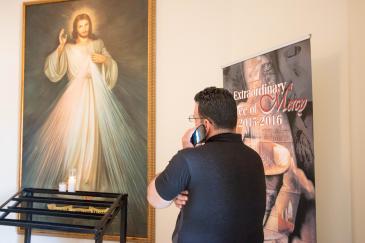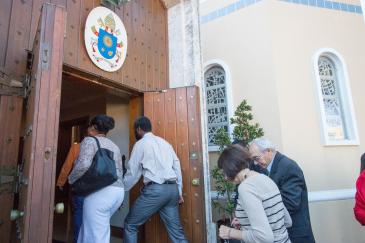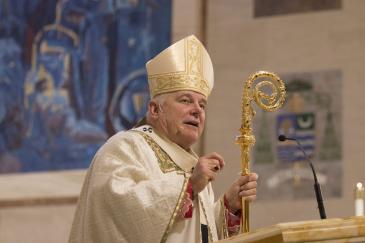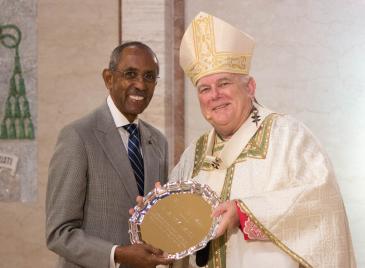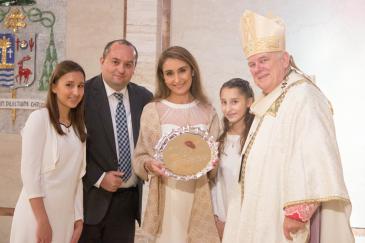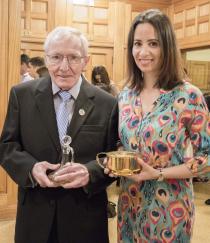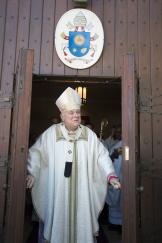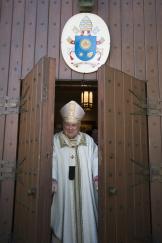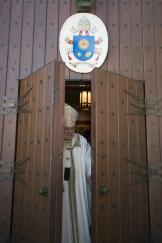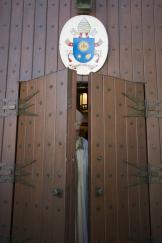By Ana Rodriguez Soto - The Archdiocese of Miami
Photography: ANA RODRIGUEZ-SOTO | FC
MIAMI | Gladys Mazzei really wanted to attend the closing of a Holy Door.
The St. Bonaventure parishioner was aiming for the 3 p.m. closing of the one at the Shrine of Our Lady of Charity in Miami.
But her husband reminded her of a prior appointment: As donors to the ABCD (Archbishop’s Charity and Development appeal), they had committed to attending the annual Thanks-for-Giving Mass and brunch at St. Mary Cathedral.

Photographer: ANA RODRIGUEZ-SOTO | FC
Archbishop Thomas Wenski presents the One in Hope award to Patrick Range of Holy Redeemer Parish in Liberty City during the Thanks-for-Giving Mass for archdiocesan donors, Nov. 20 at St. Mary Cathedral.
Mazzei was overjoyed when she realized Archbishop Thomas Wenski would be closing the cathedral’s Holy Door immediately after the Mass. She not only walked through the door before it closed, she also was among the dozens who stood in line for confession before the Mass.
Confession, attendance at Mass, and prayers for the pope are what the Church requires for obtaining a plenary indulgence � remission from the temporal punishment of sin, otherwise known as time in purgatory. The indulgences were obtainable throughout the Year of Mercy, which concluded Nov. 20, the feast of Christ the King.
For Mazzei, the whole sequence of events was just more proof that God’s mercy overflows, always.
“It’s a very great gift from God,” she said while fingering her rosary and waiting for confession. “God never takes long to respond.”
But now that the Holy Door is closed, God wants our response in return, Mazzei said. “What will you do now that I have let you pass through the door?”
For Mazzei and nearly 500 others who attended the Thanks-for-Giving Mass, the response was generosity � donating to the ABCD, and remembering archdiocesan churches and schools in their wills.

Photographer: ANA RODRIGUEZ-SOTO | FC
Archbishop Thomas Wenski closes the Holy Door at St. Mary Cathedral after the Thanks-for-Giving Mass Nov. 20, feast of Christ the King and closing day of the Jubilee Year of Mercy.
As Archbishop Thomas Wenski put it in his homily, “ABCD translates the works of mercy into concrete, tangible actions” that no individual could undertake alone.
“It’s a source of pride and great satisfaction,” said Carlos Martinez of Our Lady of Guadalupe Church in Doral. “And it motivates us to continue to give to the ABCD, which is very
Martinez, along with his wife, Citlaly, were the recipients of this year’s One in Charity award, which recognizes a family “who is giving, caring, loyal and loving to their brothers and sisters in need.”
The
Carlos Martinez noted the variety of programs � educational, charitable, vocational � that are financially supported by the annual ABCD appeal.
“That’s the beauty of the program,” he said. “You can opt for various types of aid.”
“During these times, it’s so important to support these causes,” added his wife, Citlaly.
The One in Hope award this year went to a longtime member of the archdiocese, N. Patrick Range of Holy Redeemer Parish in Liberty City. He is the son of the late Athalie Range, a groundbreaking Miami civil rights leader, businesswoman and politician who also wore her Catholicism proudly.
“It’s just so humbling,” said Range, describing himself as very surprised.
The One in Hope award recognizes a family “who embodies the four infinitives of stewardship: receives God’s gifts gratefully; nurtures God’s gifts responsibly; shares God’s gifts justly and sacrificially; and returns God’s gifts abundantly.”
“My mom is my inspiration,” Range said. “I hope that she would be honored by my having received this for the family.”
The recipients of the One in Faith award could not be present at the Mass. Javier and Lilia Hernandez, members of Assumption Parish in Lauderdale-By-The-Sea, were honored for representing “excellence in evangelization” by being firmly committed to spreading the Good News.
The Thanks-for-Giving Mass is organized each year by the archdiocesan Office of Development to thank those who contribute to the ABCD � currently a little over 30,000 South Florida Catholics. The pledges are taken up in each parish every year at the end of January.
During the Mass, the development office also inducts new members into the Archbishop Coleman Carroll Legacy Society. Named after Miami’s first bishop, the society recognizes those who have included the archdiocese, or any of its parishes, schools or entities, in their estate plans.
The office encourages people who are planning to do so to notify them so that they might be recognized in life, not just posthumously.

Photographer: ANA RODRIGUEZ-SOTO | FC
Archbishop Thomas Wenski presents the One in Charity award to the Martinez family of Our Lady of Guadalupe Church in Doral. From left: daughter AnaPaula, 14, dad Carlos, mom Citlaly and daughter Renata, 12. The One in Faith, One in Hope and One in Charity awards were presented at the annual Thanks-for-Giving Mass for archdiocesan donors, Nov. 20 at St. Mary Cathedral.

